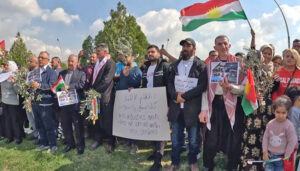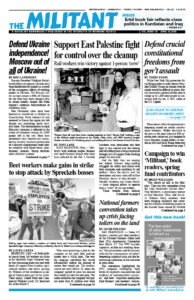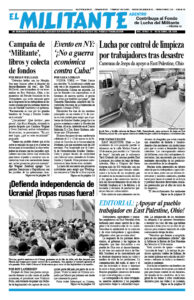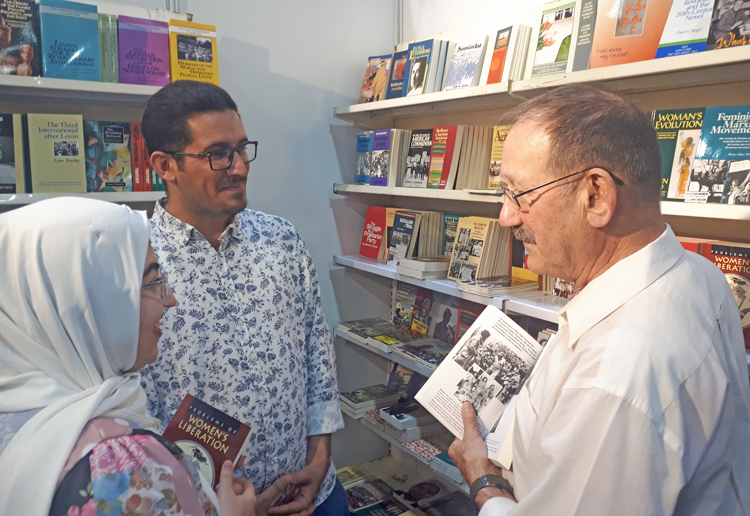ERBIL, Kurdistan Region, Iraq — On March 16 participants in the 15th Erbil International Book Fair observed a moment of silence, joining people across Kurdistan in marking 35 years since the Saddam Hussein dictatorship attacked the town of Halabja with chemical weapons. Some 5,000 Kurds were killed and thousands more injured.
The 1988 attack was part of the Iraqi regime’s genocidal campaign to crush the Kurdish people’s fight for national self-determination. It came toward the end of the 1980-88 Iran-Iraq war, in which Baghdad was being backed by Washington, under the cover of “neutrality,” in Saddam’s bloody grab to capture oil-rich territory from Iran and set back the Iranian Revolution.
The commemoration was a reminder of the brutal history of oppression of the Kurds by successive regimes in Iraq, Iran, Turkey and Syria ever since the division of the region by British and French imperialism a century ago. Even more, it underscored how far the still-unfinished struggle for self-determination of the 30 million Kurds living in those four countries has come.
A cultural event such as a book fair attracting huge crowds, 600,000 according to the organizers, would have been unthinkable without those advances.
The 11-day fair, held for the first time since 2019 due to the COVID-19 pandemic, was organized by the Baghdad-based cultural organization Al-Mada. It brought together over 350 publishers, mainly from Iraq and the Middle East. A majority presented books in Arabic, while 60 publishers showcased the flourishing of Kurdish writing. Some dozen English-language stands were eagerly sought out too.
Participants traveled from Baghdad, Kirkuk, Mosul and other Iraqi cities, as well as from across Iraqi Kurdistan.
Erbil, an ancient city and today capital of the Kurdistan region in Iraq, reflects political and social conditions flowing from decades of dictatorship, imperialist invasions and civil wars in both Iraq and Syria and the broader region. This city has been hit by ballistic missiles launched by Tehran or Tehran-backed militias several times since 2020, as have other towns and villages under the Kurdistan Regional Government.
Since the 2003 U.S.-led invasion of Iraq and the years of violence that followed, Kurdistan has been swelled by refugees — Kurds, Arabs, Turkmen, Yazidis and others — from other parts of Iraq. Since 2011 they have been joined by refugees from the civil war in Syria.
Interest in the world
Pathfinder Books in London this year participated in the fair for the fourth time. It sold 1,200 books by communist and other revolutionary leaders published by New York-based Pathfinder Press on world politics; working-class, union and anti-imperialist struggles; and a materialist, scientific world view. While some came looking for books on Kurdistan and the Middle East, what was most notable was the broad interest in the world, from Moscow’s brutal war on the Ukrainian people and their country, to the example of Cuba’s socialist revolution, and much more.

Among the top sellers were books presenting a working-class political response to the shattering of imperialism’s post-World War II order and its consequences for toilers worldwide. This included Pathfinder’s latest title, The Low Point of Labor Resistance Is Behind Us: The Socialist Workers Party Looks Forward by SWP leaders Jack Barnes, Mary-Alice Waters and Steve Clark (68 copies sold), which was among the books presented on the main stage of the fair. Others were Labor, Nature, and the Evolution of Humanity: The Long View of History (94), by the founders of the communist movement, Karl Marx and Frederick Engels, as well as by SWP leaders Waters and George Novack; and Are They Rich Because They’re Smart? Class, Privilege, and Learning Under Capitalism (76) by Barnes.
Many sought out the stand not only for the books but also to discuss these questions and share experiences with the worker-volunteers from the U.S., U.K. and Canada staffing it.
Labor, Nature, and the Evolution of Humanity was both the most popular and most debated book. Some objected to its defense of a materialist, evolutionary approach to human biology and society as being against religious teachings, while others — believers and nonbelievers alike — wanted the book for that very reason. Some had heard about debates in the U.S. and other imperialist countries over “woke” views promoted by upper-middle-class meritocratic layers and wanted to read a Marxist rebuttal of these “profoundly anti-working-class, anti-science” views, in the words of the introductory article by Waters. Only a handful were attracted to “wokery.” The interest in the title led a Syrian-based publisher to decide to produce an Arabic translation.
High-school student Mina Mahmood bought History of the Russian Revolution by Leon Trotsky. “I saw a documentary that showed the people, but not what they were going through,” she said. “It was all about the czar and czarina, but I wanted to find out more about when Lenin and the Bolsheviks took over the state,” leading the working class in carrying out the world’s first socialist revolution. Twelve copies were sold, including one in Russian.
“I read things online, but my sister said I have to read a book, so I’m buying my first one,” said Hunar Eshan, who like many young people here is looking for work. “I’ll start with Malcolm X Talks to Young People, and then read the Communist Manifesto.”
Workers share experiences
“My father has been in Canada for almost seven years. I was nine years old when he left, and I haven’t seen him since,” Seroush Mohamoued told Pathfinder volunteer Joe Young, who works in an industrial bakery in Montreal. Mohamoued continued, “Immigrants are there to work but their families can’t visit.”
Young explained the Canadian rulers’ anti-immigrant policies are designed to bring in overseas workers with limited rights, to keep them as a source of cheap labor, but they end up becoming part of working-class struggles and unions.
Others described unsafe conditions at work and irregular wages. “We’re paid $600 a month,” said Ahmed, a monitor at an oil refinery who preferred not giving his last name. “The wages have stayed the same for years, but prices are going up here like everywhere else. During the pandemic, they shut down the refinery for two years and we received no wages.” The refinery is nonunion, he said, as others working in oil and construction told Pathfinder stand volunteers. These are the major industries here.
Many were interested in the experience of union struggles in other countries described by volunteers and in many of the books. At the same time, most said it was difficult to organize in Iraq in face of the constant threat of war, with repeated interventions by the Turkish and Iranian regimes and U.S. troop deployments.
A student from Kirkuk pointed to the challenge of building working-class solidarity in face of national divisions. Kirkuk is a multiethnic city had been part of the Kurdistan Regional Government until it was taken by force by the central government in Baghdad in 2017. “When an Arab is head of the oil company, he’ll promote Arabs, and when it’s a Turkmen or a Kurd they’ll do the same for ‘their’ people.” Attempts to elevate Arabic above other languages in Kirkuk have met resistance from Kurds, Turkmen and others.
Books on the working-class fight against imperialist war, as well as national oppression and bigotry, saw brisk sales. These included issue no. 7 of New International magazine featuring “The Opening Guns of World War III: Washington’s Assault on Iraq” (21) and Malcolm X, Black Liberation, and the Road to Workers Power (35), both by Barnes.
The Jewish Question: A Marxist Interpretation by Abram Leon was the fourth top seller (52 copies). Many at the fair knew about the persecution of Jews in Iraq and their wholesale expulsion with the establishment of Israel as a haven for Jews after the genocide of the Holocaust. They wanted to learn more about the causes of Jew-hatred and what could be done to end it. A Baghdad-based publisher signed an agreement to produce an Arabic translation, including Pathfinder’s new 2020 introduction by SWP leader Dave Prince. The publisher signed on for four other Pathfinder titles as well.
Books on women’s liberation by Evelyn Reed and others were in high demand. Two of those, Problems of Women’s Liberation and Sexism and Science by Reed, were being sold in Arabic translation by Lebanese-Iraqi publisher Nousous, along with Are They Rich Because They’re Smart? Ayad Hassan at Nousous reported that each had an initial print run of 1,000 a year or so ago, of which only a few dozen are left.
Damascus-based Taakwen brought to the fair two new translations of Pathfinder titles — Women in Cuba: The Making of a Revolution Within the Revolution, and Rosa Luxemburg Speaks, both edited and introduced by Mary-Alice Waters.


